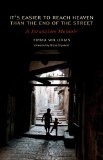Summary | Excerpt | Reviews | Beyond the Book | Readalikes | Genres & Themes | Author Bio

 Book Reviewed by:
Book Reviewed by:
Kim Kovacs
Buy This Book
The general was telling me how Palestinians wanted all Jews
out of the West Bank and Gaza Strip, and that their ideas were not
based on mutual recognition; they want an independent
Palestinian state without Jews. “Unlike Israel, of course, which is
one fifth Palestinian.” And they want us “to take back the refugees
as well.” He broke off, mildly angry.
I had questions, but he was explaining in his own way.
“The Hashemite Kingdom is, of course, two thirds Palestinian,”
he was saying about Jordan. “Amman is almost entirely Palestinian.”
And then: “As for women, you know that to them women are less
than donkeys and dogs. An Arab of 75 came to me asking for fertility
treatment — he had a 25-year-old wife! You can buy women in their
society.”
I thought of men buying women, that it’s not impossible to
buy anyone, anywhere.
“You remember the suicide bombing by the woman at Erez?”
I nodded.
“She was having an affair with her husband’s boss, a Hamas
man. Her family left her no choice. Either she died ‘with honor’—
as a suicide bomber—or she got killed.”
“How did we get here, though? Into this terrible situation?”
“In 2000, Arafat decided to use terror to break us. He was
confident he would break us with their terror. This was the correct
assessment I presented before Camp David.
“Israel suffers far more from terror than any previous people.
Israelis are remarkable people—they show unbelievable resistance.
People don’t understand what it’s like. We were briefing a delegation
and I was explaining to them that I was never sure whether I
would see my wife alive each night. At that very moment my
daughter called me to say that there had been a suicide bomb in
Herzliya. My mother, my wife, and my daughter had left the scene
one minute before it went off. The Hungarian delegate said to the
Russian, ‘Now I understand, and I’m leaving.’”
I thought back to my own narrow escape from a suicide
bombing, and the cold horror of knowing how close the three children
and I (pregnant with our fourth) had been.
“They failed,” the General was saying, “the Palestinians,
because we don’t do revenge, we don’t do atrocities, we don’t do
rape—the Russians in April and May 1945 ordered their soldiers
to rape German women. Even torture—I don’t think there is any
here because it’s against the law. As for assassinations, the British
are so hypocritical...” He tutted. “But it is intolerable to have so
many casualties.”
I wondered for a moment whose casualties he meant. Then I
realized he was talking about the spring of 2002, when 129 Israelis
were killed in suicide bombings and other attacks.
“Let me tell you, in March 2002 we opened a new chapter.”
“Operation Defensive Shield?” Israel’s April 2002 invasion of
Palestinian cities, most famously Jenin.
“Yes. We are weak in propaganda, I’m not sure why. Saeb
Erekat said 700 were killed, but in fact only 53 died — I’ve got the
names. And we saved the hospital in Jenin — I financed generators
for them: 1 million shekels. And we arranged the hospitalization
of the wounded. The director of the hospital lied when he said the
hospital was hit.”
I let these facts roll out: by now I’d lived in Jerusalem for some
time. I asked him where he thought the situation was going.
“You have to understand this, we are dealing with an entity
that will never accept us.”
He let this sink in, and then added: “The Holocaust was so
cruel” and that Palestinian attitudes reminded so many Israelis of
this. “I’m not sure if I have the answer as to where we are going.
You don’t understand the hatred. Do you know how many
Palestinian workers turn on their Israeli bosses and kill them?”
I didn’t.He continued. “And this hatred comes from incitement.The
incitement is terrible, unbelievable. In 2000 Arafat could have had all
the settlements removed, but he wants only the final solution.”
Excerpted from It's Easier to Reach Heaven Than the End of the Street by Emma Williams. Copyright © 2009 by Emma Williams. Excerpted by permission of Interlink Books. All rights reserved. No part of this excerpt may be reproduced or reprinted without permission in writing from the publisher.





The Funeral Cryer by Wenyan Lu
Debut novelist Wenyan Lu brings us this witty yet profound story about one woman's midlife reawakening in contemporary rural China.
Your guide toexceptional books
BookBrowse seeks out and recommends the best in contemporary fiction and nonfiction—books that not only engage and entertain but also deepen our understanding of ourselves and the world around us.